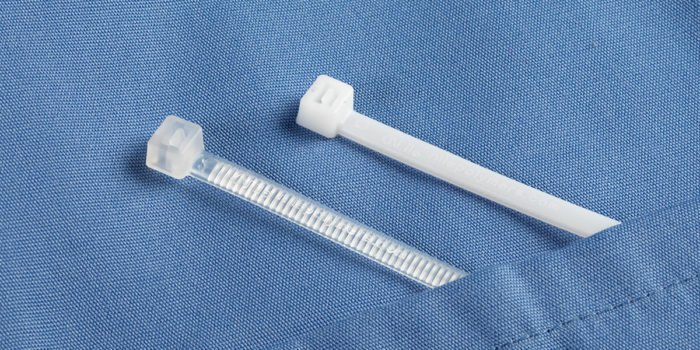
Strong-Ty™ Cable Ties: PVDF meets international regulations
 Concerns about material safety and traceability are more important than ever as cable ties made from inferior materials flood the market. In mission-critical applications polymer substitution or manufacturing shortcuts are unacceptable. How confident are you in your current cable tie? What materials, including additives, stabilizers, fillers, plasticizers and regrind are part of your final cable tie product? Are all of these components acceptable and can you trace each of them back to the point of origin?
Concerns about material safety and traceability are more important than ever as cable ties made from inferior materials flood the market. In mission-critical applications polymer substitution or manufacturing shortcuts are unacceptable. How confident are you in your current cable tie? What materials, including additives, stabilizers, fillers, plasticizers and regrind are part of your final cable tie product? Are all of these components acceptable and can you trace each of them back to the point of origin?
Our Strong-Ty™ cable ties are manufactured in the US and are fully traceable throughout the entire supply chain. They are made from 100% Kynar® PVDF and contain no additives, fillers, stabilizers or processing aids. Strong-Ty™ cable ties are manufactured and packaged according to an ISO 13485 procedure and meet the following national and international regulatory issues:
- NSF 61 – This standard defines suitable materials for use in drinking water components. Strong-Ty™ cables ties are made from Kynar® PVDF and are fully NSF 61 compliant.
- Bisphenol A – BPA is a chemical compound found in epoxies and polycarbonate and acts to mimic the effects of estrogen in the body. In 2012 the US FDA banned the use of BPA in baby bottles. Strong-Ty™ cables ties are made from Kynar® PVDF and are BPA free.
- BSE/TSE – Bovine Spongiform Encephalopathy (BSE) is also known as “mad cow disease” and is a transmissible spongiform encephalopathy (TSE) cattle disease caused by an incorrectly folded protein or prion. Transmissible to humans this disease is known as new variant Creutzfeldt–Jakob disease. Strong-Ty™ cables ties are made from Kynar® PVDF and do not come into contact with any animal products anywhere in the polymerization, injection molding or packaging process. Strong-Ty™ cable ties are BSE and TSE free.
- China RoHS Defined Substances – Restriction of Hazardous Substances (RoHS) are regulations enacted by the Chinese government that prohibit the incorporation of lead, mercury, cadmium, hexavalent chrome, polybrominated biphenyls, and polybrominated biphenyl ethers in any products. There is no use of these elements or compounds in the manufacturing process of Strong-Ty™ Kynar® PVDF cable ties.
- EU RoHS – European law restricting the use of the same six items in the Chinese RoHS and an additional four phthalate-based compounds. Strong-Ty™ Kynar® PVDF cable ties are phthalate free and meet EU RoHS compliance.
- United States Clean Air Act (40 CFR Part 82) Ozone Depleting Substances – This law details the reduction and elimination of ozone-depleting compounds as defined in the Montreal Protocol including chlorofluorocarbons (CFCs). Strong-Ty™ Kynar® PVDF cable ties are manufactured without ozone-depleting compounds.
- Stockholm Convention on Persistent Organic Pollutants – Mandates the restriction or elimination of persistent organics pollutants (POP) including polychlorinated bisphenols (PCB) and dichloro-diphenyl-trichloroethane (DDT). Strong-Ty™ Kynar® PVDF cable ties are manufactured without POP contaminants.
- Clean Air Act Volatile Organic Compounds – The polymerization, injection molding and packaging of Strong-Ty™ PVDF cable ties are done without volatile organic compounds (VOC).
A more detailed letter regarding regulatory compliance is available for review. Please contact us for a copy. Additional information about Strong-Ty™ Cable Ties and PVDF, in general, can be found on the following pages:


